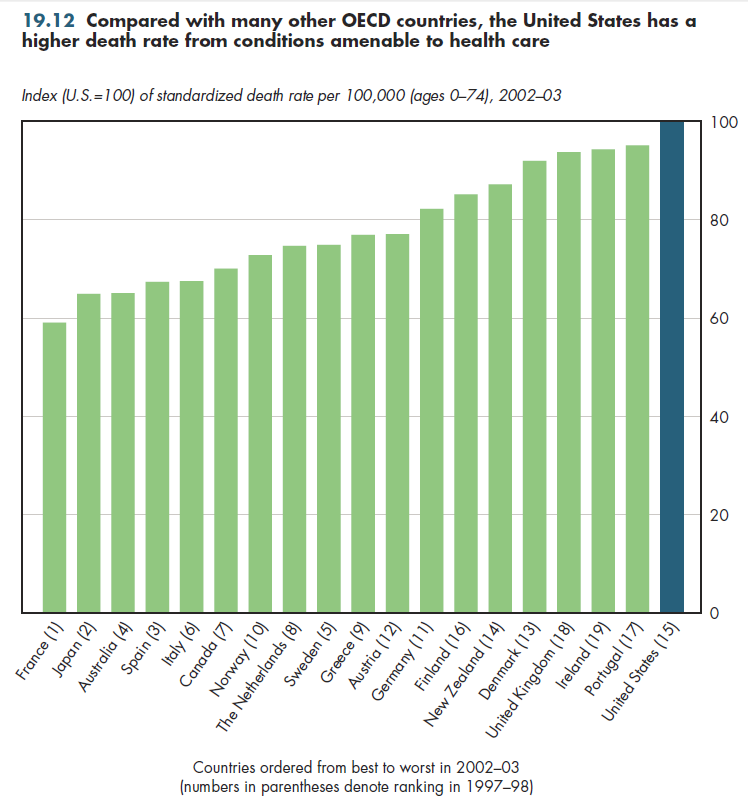Download PowerPoint versions of figure.
Inside Collection (Book): American Health Economy Illustrated
19.12 US Has More Avoidable Deaths Amenable to Health Care among Industrialized Nations
Summary: Despite its superiority in many health outcomes related to medical care, the United States has relatively more avoidable deaths amenable to health care than do many other industrialized countries.
The United States ranks nineteenth among industrialized countries in the rate of deaths amenable to health care (figure 19.12). "Amenable deaths" refer to deaths from selected causes that should not occur in the presence of timely and effective health care. Such deaths constitute approximately 25 percent of deaths for males who are younger than age 75 and approximately 30 percent of deaths in that age group for females. An important advantage of this measure is that it excludes deaths that do not necessarily reflect problems of access or quality of the medical care system. The death rates used to calculate the estimates in figure 19.12 were standardized by gender and five-year age categories. Thus, observed differences cannot be attributed to basic demographic differences in the U.S. population compared with elsewhere.

However, the numbers are not standardized based on race. In light of widespread racial and ethnic disparities in U.S. health outcomes—little of which reflect poor health system performance—this limitation might disproportionately cast the United States in a worse light. Moreover, the authors of the study that produced these data have cautioned, "The rate of amenable mortality is a valuable indicator of health care system performance, although it is important to note that the underlying concept should not be mistaken as definitive evidence of differences in the effectiveness of health care but rather as an indicator of potential weaknesses in health care that can then be investigated in more depth."
With these caveats, the available data show that some OECD countries have rates much lower than in the United States. For example, France and Japan have rates approximately 40 percent less than in the United States. Even the UK, which lagged behind in some of the comparisons of cancer survival rates and infant mortality by birth-weight, outperforms the United States on this metric. Second, amenable mortality rates declined only 4 percent in the United States between 1997-1998 and 2002-2003, compared with an average decline of 17 percent among all countries studied. This fact suggests that the United States is falling behind rather than catching up to its competitors on this measure.
Downloads
References
- Nolte E and CM McKee. Measuring the Health of Nations: Updating an Earlier Analysis. Health Affairs 2008; 27(1):58-71.
Collection Navigation
- « Previous module in collection 19.11 US Cancer Patients Have Better Chances of Survival among Industrialized Nations
- Collection home: American Health Economy Illustrated
- Next module in collection » 19.13 Most "Avoidable" Deaths Are Related to Lifestyle or Behavior
Content actions
Give feedback:
Download:
Add:
Reuse / Edit:
Twin Cities Campus:
- © 2012 Regents of the University of Minnesota. All rights reserved.
- The University of Minnesota is an equal opportunity educator and employer. Privacy
- Last modified on Sep 24, 2013 3:48 pm -0500









